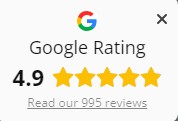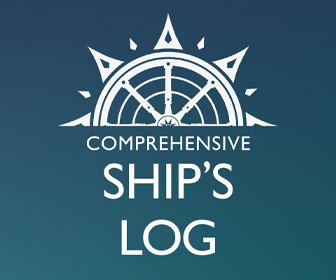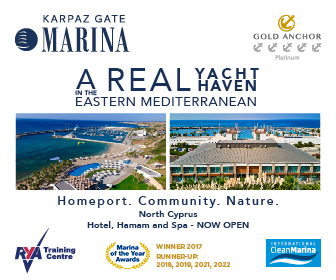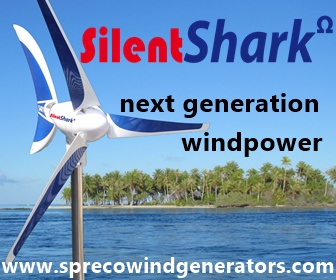How to visit Syria by boat
Published 16 years ago, updated 6 years ago
The main port of entry for pleasure yachts coming to Syria is Lattakia, where you will find the “Syrian Yacht Club” which offers mooring, handles the immigration procedures and can organize and give advice on land tours through Syria. The club is situated in the northern part of the fishing port (Nadir Yacht), which is found in the NE corner of the main harbour.
Book your visit in advance with the Syrian Yacht Club to make sure they have space, and so that they can prepare the processing of your visa(s) before you arrive. Send an email with a scanned copy of your passport(s) as an attachment (.pdf) or fax them a copy of your passport(s).
Your approach to Lattakia should start 12 nm (the beginning of the approach fairway at the territorial border) west of the city, where you need to contact “Lattakia Radio” on VHF 16. A good waypoint is 35° 31.50N 35° 30.50E. Explain that you have a booking with the Syrian Yacht Club and wish to approach Lattakia. Answer all questions and wait for a go ahead. They might tell you to call again at 6 nm to contact “Lattakia Pilot”, also on VHF 16. Simply follow the instructions.
Using a 90 degrees course, make for the harbour entrance, which is marked by a red and a green lateral mark. Note that according to the chart there is an above surface wreck N of the lateral marks. Once passed the lateral marks make for the marina entrance due to NE. Look for a conspicuous black/white tall building.
The club mooring is along the northern breakwater. There are some scattered laid moorings (lines with attached free-floating buoys) in the basin, so take care when manoeuvring to keep your prop from getting tangled. Take a laid mooring if convenient, or use your own anchor and go stern or bow to. If space permits you can probably go alongside. Visiting yachts are still rare, but there are a handful of local motor cruisers in the basin.
The customs and immigration officials will come to your boat, and you are not allowed to leave the boat until the process is completed. All official offices are closed in Syria on Fridays and Saturdays as well as on several other national holidays. Make sure to arrive on a weekday (Sunday to Thursday), and preferably in the morning.
The customs and immigration officials will ask you for: a signed list of your last 5 ports of call, a signed crew list, passports, copies of your boat registration, copies of the exit stamp and/or marina receipt from your most recent port of call. They will also ask to see your logbook and might look inside your boat. You cannot enter Syria if you have been to Israel before, with or without a stamp in your passport, and if you cannot show proof of your itinerary of how you got there they might refuse your entry. The process is very straightforward and there is no baksheesh.
The visa processing should only take a few hours, after which you will get back your passport(s) with an entry stamp (tourist visa) and a separate paper (Entry/Exit Card for Arabs & Foreigners). The passport and Entry/Exit Card is checked at various places if you travel around the country, such as when buying train/bus/plane tickets and checking into hotels. The visa cost is said to be reciprocal (based on your nationality) but was $60 / person for us with 3 different nationalities. The tourist visa is valid for 15 days but can easily be extended for up to a month at a time at immigration offices in all major towns and cities (you need 3-6 passport photos and the cost is around $1).
The yacht club is situated a few kilometres north of the city centre. It offers facilities such as electricity, water (non-potable), toilets, shower, washing machine ($4/machine), wi-fi in the office, and very friendly staff. There is a restaurant behind the marina office with good food, beer/wine, and good prices (around S£400 / $8 per person for a meal with beer). You can also find the standard shawarma and grilled chicken places a few hundred meters past the tall black/white building on the main road towards town. A taxi to town costs at a time of writing around S£50 / $1. A taxi back might cost slightly more. Ask for “Nadir Yacht” (fishing harbour) to get back. Due to the fuel crisis (see below) the taxi prices are sure to increase shortly.
Diesel is subsidised by the state and there was a supply shortage in April 2008 due to black market exports to neighbouring countries. It is not clear what the rules and regulations are but we were told that we could officially only get up to 200 liters per boat (but this might have been due to the supply shortage). The price was S£40 / $0.89 per litre and the pump price was S£9 / $0.20. The marina guard is in charge for diesel supply and surprisingly (in light of the hefty markup) expects to get baksheesh.
The mooring fee is the highest we have come across in the Eastern Med. The price is based on a table taking your LOA x Beam x US$ to calculate the price (the table can be found on their website). Our boat is 54’ and the price came to $47 per night. There is also an additional fee called “formalities” of $20 per person on the boat. Electricity and water are included in the price, and there is no additional tax or VAT.
When you are ready to leave you to need to inform the Yacht Club so that they can arrange for the customs and immigration officials to come to your boat again. Inform them at least one day in advance, and remember that you cannot leave on a Friday, Saturday, or national holiday. In our case, we were asked to give them our passports the night before departure. The customs and immigration came at 10 am the following day, and the exit procedure took no more than an hour. You can then no longer leave your boat, and you are expected to leave the country without delay (again via the 12nm long fairway due west).
Communication
Communications in Syria work very well. You can buy a SIM card for your mobile phone and the rates seem to be a good value. Make sure you are given a paper contract when you buy the SIM card because the first day or so is only a temporary connection (with no calls abroad), and you then need to go to a head office to activate the real connection.
Internet Cafes are sometimes hard to find but were available wherever we went. The Yacht Club has wi-fi in the office, although it did seem a bit temperamental and was often down for us.
Travel
Travel is both easy and cheap in Syria, and we tried just about all means of transportation.
Here is our travel route, which turned out perfect for us:
(1) Train from Lattakia to Aleppo (2 ½ or 3 ½ hours)
A beautiful train ride through the mountains
S£70 / $1.50 for a first class ticket
(2) Bus from Aleppo to Hama (1 ¾ hours)
Ask for the “luxury bus station”, we ended up with a very comfortable and clean bus with a Stewart, air-condition, and movie.
S£58 / $1 per person
From Hama, we rented a mini-van with a driver one day to see Apamea and the dead cities $60, and a mini-van the next day to see Krak des Chevaliers and to drop us at the “luxury bus station” in Homs $35.
There are several private “luxury bus” companies (Kadmous, Al-Ahliah, and Al-Rayan) and the time schedules can be hard to find. In Aleppo, Hama, Homs, and Damascus they all leave from the same station, but tickets are bought from different offices. In Palmyra, they each go from a café belonging to the company but they are all close to each other. Interestingly 2 of 3 ticket sellers for us tried to charge us more than the real ticket price by not giving back the correct change.
(3) Bus from Homs to Palmyra (2 hours)
Interesting ride through the desert
S£70 / $1.50 per person
(4) Bus from Palmyra to Damascus (3 hours)
Mostly a desert ride
S£125 / $2.70 per person
(5) Plane from Damascus to Lattakia (45 min)
Nice scenic ride in a small jet plane
S£800 / $17.40 per person
Comments
Syria is truly a wonderful country with so much to see and experience. We travelled around for 9 days but could have carried on much longer, and we are sure to come back again. I will not try to explain why we liked it so much, it is something you have to experience yourself, and if you are open to new cultures, alternative political systems, and old-fashioned merchandising I am sure you will love it as much as we did.
Our only gripe is the cost of mooring at the Syrian Yacht Club. Our bill for 14 days came to around $700. That is more than we pay for a Suez Canal passage and is equivalent to 3 months mooring in a luxury marina in Egypt. Some comparisons in the area are Larnaca, Cyprus $10 / night, Egypt (Abu Tig, Hurghada, Suez Canal) $20 / night, Rhodes $23 / night, Turkish municipal harbours $20-$25 / night (all prices are from 2007/2008 and based on our boat).
Flying to Damascus with Syrian air (www.syriaair.com) is a very good value so an alternative is to fly from Cairo or Larnaca, or to sail to Lebanon and travel by bus or taxi. Arriving by air or road does, however, mean that you must obtain a Syrian visa before travelling, and the visa must be obtained at a consulate in your home country. There is, however, reports in the “Lonely Planet” saying that visas are sometimes issued at the border and the Syrian embassy in Cairo issues visas (valid for presentation for one month only) to all nationalities.
As always immigration rules and regulations do change regularly so make sure to find out what the current situation is before you plan your trip.
Books
We advise you to travel with a guidebook to get the most out of your visit. If you plan and book your own trip then get a Syrian SIM card when you arrive and you can then call ahead and book hotels and buses along the way.
Lonely Planet, Syria & Lebanon (basic text for each place/site and much hotel and travel information)
Bradt, Syria by Diana Darke (very comprehensive text for each place/site but less hotel and travel information)
Travel with both books if you can.
Information
Currency April 2008 (Syrian Pound S£)
1€ = S£71
1$ = S£46
1£ = S£91
High season: April, May, October, and November
Syrian Yacht Club
Tel. 00963 (0)41 311110
Fax. 00963 (0)41 452379
Email: syrychtclb@mail.sy
Website: www.syrianyachtclub.com/
Written by Per Kjellqvist on S/Y Sybaris based on a visit in April/May 2008






